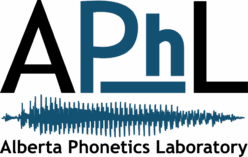Uncategorized
-
Telus World of Science and Massive Auditory Lexical Decision!
Come find us running our most recent experiment as part of the Lab Quests program at the Telus World of Science! This experiment is for ages 4 and up and you can compete on our leader board. We are at the Telus World of Science from 9:30 am to 3:00 pm August 2, 3, 9,…
-
Forced alignment on raw audio with deep neural networks
Linguists performing phonetic research often need to perform measurements on the acoustic segments that make up spoken utterances. Segmenting an audio file is a difficult and time-intensive task, however, so many researchers turn to computer programs to perform this task for them. These programs are called forced aligners, and they perform a process called forced…
-
MALD: Massive Auditory Lexical Decision
How do humans recognize speech? How do factors such as native language, age, and dialect have an effect on the way in which words are recognized? A common concern among people as they get older is age related decline; in other words, does our cognitive ability decline with age? Ramscar et al. (2014) show that it may not…
-
Listening Experiment
Thank you for your interest in our experiment! Purpose: to investigate language comprehension in Canadian English speakers Eligible participants are: Monolingual Canadian English speakers (knowledge of different languages is ok as long as English was the language spoken at home while growing up) 30 years old and above Participation includes: Basic hearing test Listening to…
-
Single MALD
Single MALD Speech Perception Experiment Thank you for your interest in our experiment. In this experiment we are investigating language comprehension and are looking for native speakers of Western Canadian English, 18 – 30 years old. Before being selected a brief interview will establish whether you can participate. We are looking for participants who can…
-
Assessment of vowel overlap metrics
An item of interest to linguists is vowel overlap, or how much two categories of vowels overlap in a language. Though there are a number of cues that help distinguish one vowel the first two formants, F1 and F2, as well as the duration of the vowel, are the most prominent. The question is how…
-
DataCamp
Check out the amazing DataCamp website for learning R and Python.
-
Lex
Learning new words Thank you for your interest in the experiment. The results of this study will help us understand how adults learn nonnative words. The experiment consists of two main parts: learning and testing. In the learning phase, you will hear words in an unfamiliar language and see their pictured-meanings. Your task is to listen…
-
Tucson MALD
Thank you for your interest in our paid experiment! We’re investigating how people talk, understand speech, and identify words in collaboration with the Douglass Phonetics Laboratory at the University of Arizona. Who: monolingual native speakers of English (experience studying a non-English language as a teenager or adult is not a problem) Task: your visit to the lab will…
-
Lab Group Fall 2015
